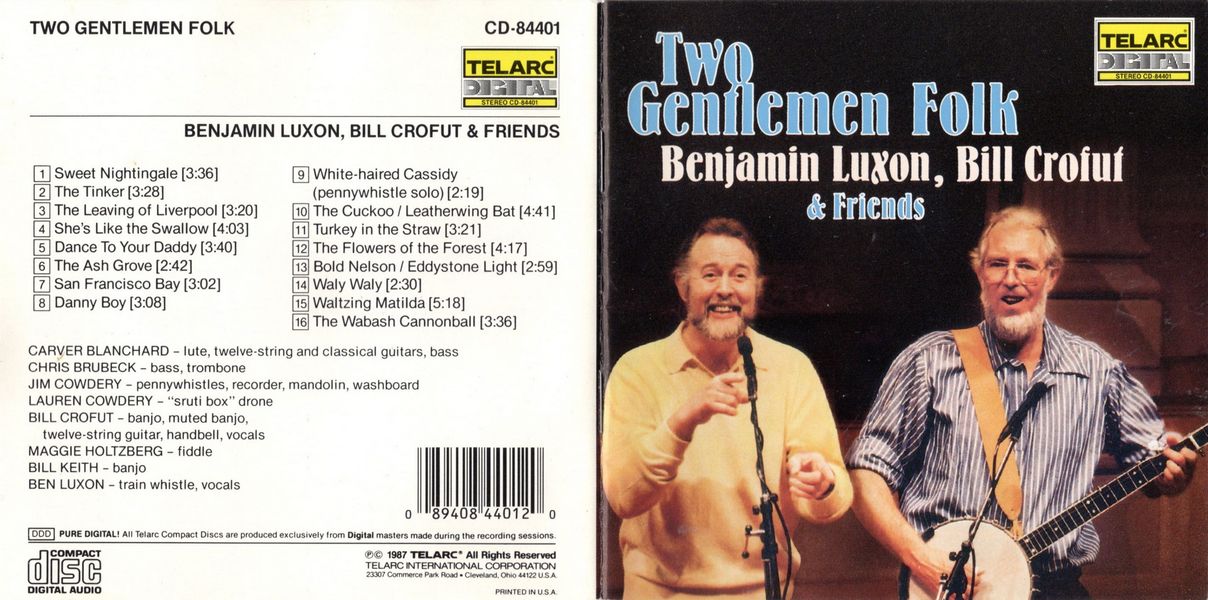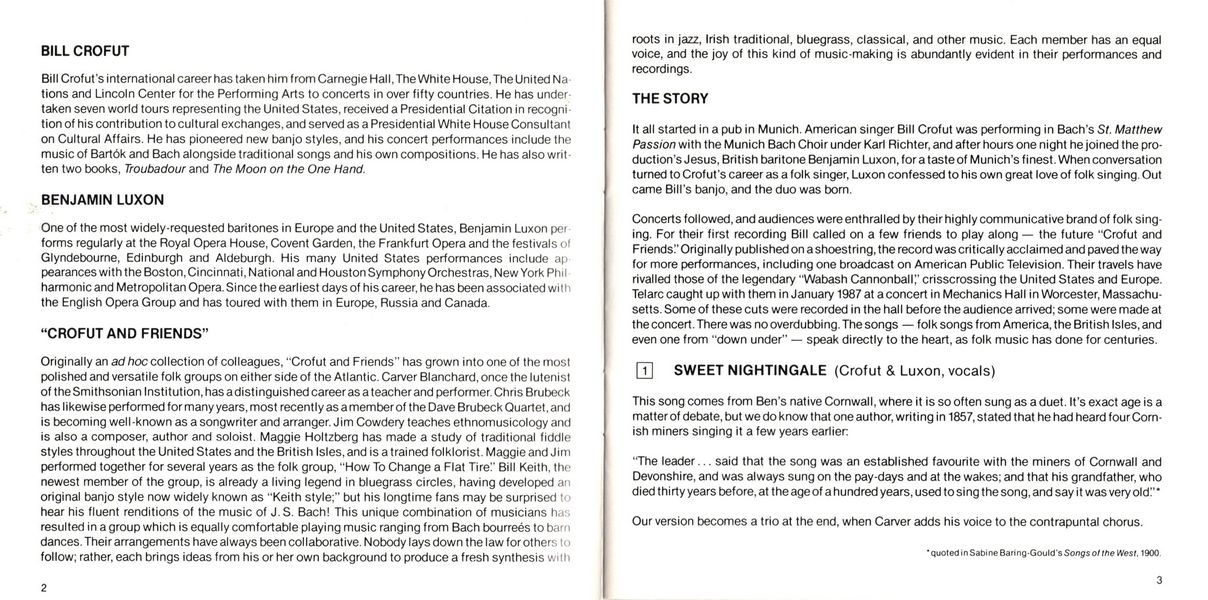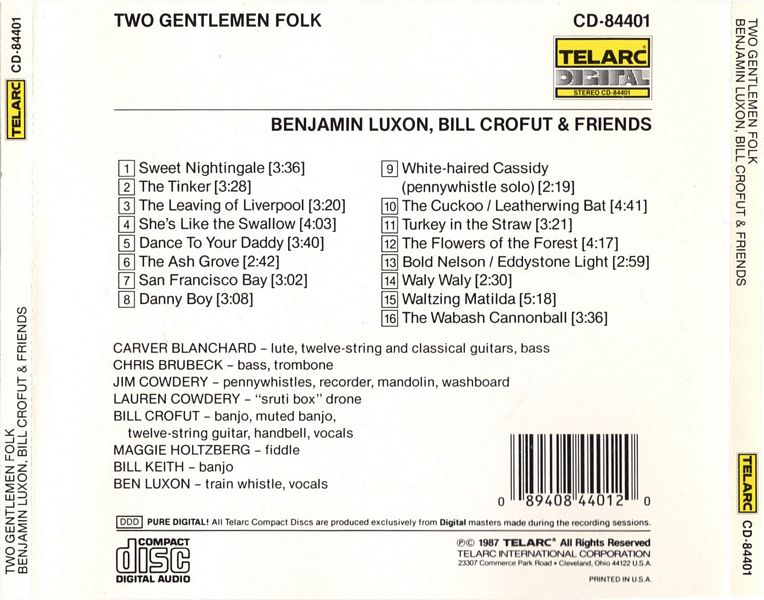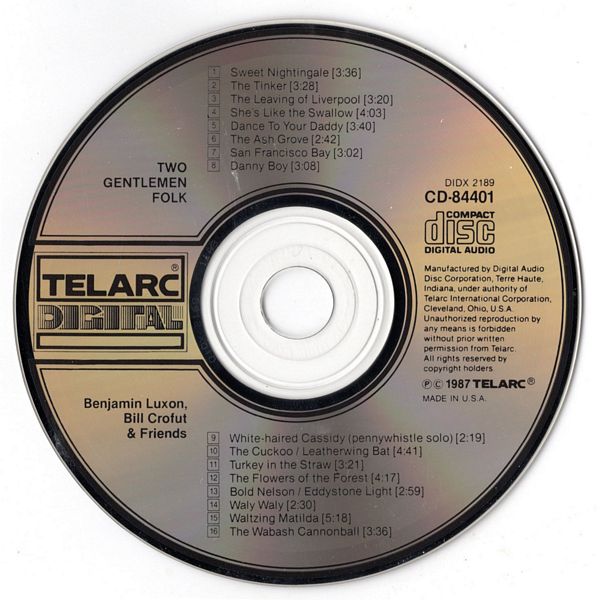
 |


|

 |
| more images |
Sleeve Notes
Bill Crofut — Bill Crofut's international career has taken him from Carnegie Hall, The White House, The United Nations and Lincoln Center for the Performing Arts to concerts in over fifty countries. He has under taken seven world tours representing the United States, received a Presidential Citation in recognition of his contribution to cultural exchanges, and served as a Presidential White House Consultant on Cultural Affairs. He has pioneered new banjo styles, and his concert performances include the music of Bartók and Bach alongside traditional songs and his own compositions. He has also written two books, Troubadour and The Moon on the One Hand.
Benjamin Luxon — One of the most widely-requested baritones in Europe and the United States, Benjamin Luxon per forms regularly at the Royal Opera House, Covent Garden, the Frankfurt Opera and the festivals of Glyndebourne, Edinburgh and Aldeburgh. His many United States performances include appearances with the Boston, Cincinnati, National and Houston Symphony Orchestras, New York Philharmonic and Metropolitan Opera. Since the earliest days of his career, he has been associated with the English Opera Group and has toured with them in Europe, Russia and Canada.
"Crofut and Friends" — Originally an ad hoc collection of colleagues, "Crofut and Friends" has grown into one of the most polished and versatile folk groups on either side of the Atlantic. Carver Blanchard, once the lutenist of the Smithsonian Institution, has a distinguished career as a teacher and performer. Chris Brubeck has likewise performed for many years, most recently as a member of the Dave Brubeck Quartet, and is becoming well-known as a songwriter and arranger. Jim Cowdery teaches ethnomusicology and is also a composer, author and soloist. Maggie Holtzberg has made a study of traditional fiddle styles throughout the United States and the British Isles, and is a trained folklorist. Maggie and Jim performed together for several years as the folk group, "How To Change a Flat Tire:' Bill Keith, the newest member of the group, is already a living legend in bluegrass circles, having developed an original banjo style now widely known as "Keith style;" but his longtime fans may be surprised to hear his fluent renditions of the music of J. S. Bach! This unique combination of musicians has resulted in a group which is equally comfortable playing music ranging from Bach bourreés to barn dances. Their arrangements have always been collaborative. Nobody lays down the law for others to follow; rather, each brings ideas from his or her own background to produce a fresh synthesis with roots in jazz, Irish traditional, bluegrass, classical, and other music. Each member has an equal voice, and the joy of this kind of music-making is abundantly evident in their performances and recordings.
The Story — It all started in a pub in Munich. American singer Bill Crofut was performing in Bach's St. Matthew Passion with the Munich Bach Choir under Karl Richter, and after hours one night he joined the production's Jesus, British baritone Benjamin Luxon, for a taste of Munich's finest. When conversation turned to Crofut's career as a folk singer, Luxon confessed to his own great love of folk singing. Out came Bill's banjo, and the duo was born.
Concerts followed, and audiences were enthralled by their highly communicative brand of folk singing. For their first recording Bill called on a few friends to play along — the future "Crofut and Friends" Originally published on a shoestring, the record was critically acclaimed and paved the way for more performances, including one broadcast on American Public Television. Their travels have rivalled those of the legendary "Wabash Cannonball;' crisscrossing the United States and Europe. Telarc caught up with them in January 1987 at a concert in Mechanics Hall in Worcester, Massachusetts. Some of these cuts were recorded in the hall before the audience arrived; some were made at the concert. There was no overdubbing. The songs — folk songs from America, the British Isles, and even one from "down under" — speak directly to the heart, as folk music has done for centuries.
Sweet Nightingale (Crofut & Luxon, vocals) — This song comes from Ben's native Cornwall, where it is so often sung as a duet. It's exact age is a matter of debate, but we do know that one author, writing in 1857, stated that he had heard four Cornish miners singing it a few years earlier:
"The leader … said that the song was an established favourite with the miners of Cornwall and Devonshire, and was always sung on the pay-days and at the wakes; and that his grandfather, who died thirty years before, at the age of a hundred years, used to sing the song, and say it was very old"*
Our version becomes a trio at the end, when Carver adds his voice to the contrapuntal chorus.
*quoted in Sabine Baring-Gould's Songs of the West. 1900.
The Tinker (Crofut & Luxon, vocals) — Variants of this song are found all over the British Isles, wherever the nomadic "tinkers" or "gypsies" travel. It's a fine example of a "bragging" song, in which the lowborn itinerant describes his seduction by a high-class lady, punctuated by the boast, "Well, indeed I did!" This version is Irish, and we follow it with two traditional dance tunes: "The Jolly Beggarman" from Ireland (played first as a hornpipe, then as a reel), and "Cluck Old Hen" from America.
The Leaving Of Liverpool (Bill Crofut, vocals) — In the days of the great clipper ships, the usual term of apprenticeship or indenture was seven years. Pressured by economic necessity, thousands of young men left their families and sweethearts to seek their fortunes on the sea. This song articulates the pledge of loyalty young lovers made, bravely facing the prospect of seven years apart.
She's Like The Swallow (Benjamin Luxon, vocals) — This English song may seem to have a fragmented plot, but a clue to its real meaning comes in the second verse: the rose is a traditional folk symbol for manhood, and an "apron full" is likewise symbolic of pregnancy. The fair maid's story is thus told with great delicacy, focussing more on feelings than on specifics. Bill Keith follows by leading us into a dance tune composed by J. S. Bach (the second "Bourreé" from the second English Suite).
Dance To Your Daddy (Crofut & Luxon, vocals) — Versions of this song are found all over the world, wherever people "dandle" or dance babies on their laps. Such songs often speak simply and eloquently of the hopes and dreams of fond parents. This version comes from northern England.
The Ash Grove (Crofut & Luxon, vocals) — Originally this song is from Wales, where it is known as "Llwyn Onn" In a sense, it leads a double life. On the one hand, it is associated with the "penillion singing" of North Wales, an intricate, semi-improvisatory bardic style of singing in counterpoint with a harp. It is also much beloved as a simple folk song, as it is heard here.
San Francisco Bay (Crofut & Luxon, vocals) — While it's not exactly "traditional;' this song is great fun, and it gives us a chance to showcase the talents of Bill Keith and Chris Brubeck. The audience enjoyed it too, washboard and all!
Danny Boy (Benjamin Luxon, vocals) — Although many people think of this as the Irish folk song, the words were written early in this century by F. E. Weatherly. The melody, however, is a traditional Irish air. It was published by George Petrie in 1855, lacking a title. Percy Grainger liked it, and set it for piano in 1911 under the title "Irish Tune from County Derry;' since Petrie's source was in that Irish County. Other musicians borrowed it, and it became known as "The Londonderry Air;' after a city in County Derry. Our version recalls the melody's folk roots, in a simple setting for guitar and voice.
White-Haired Cassidy (pennywhistle solo) — Tomás Ó Casaide, the composer of this tune, lived in the early eighteenth century in Ireland as a monk, then as a soldier of fortune, and finally as a roving poet and singer. This melody is from an autobiographical song, in which he looks back on the sorrows and joys of his colorful career. The dance tune at the end is called "The Ewe Reel;' and comes from the great Galway flute player, Paddy Carty. Jim Cowdery, pennywhistle
The Cuckoo & Leatherwing Bat (Bill Crofut, vocals) — This pair of bird songs shows two different folk treatments of the avian world. The cuckoo has long represented inconstancy in folk poetry, and her image provides a clue to the underlying meaning of the song. (Some listeners may recognize parts of the text, which also appear in the American "On Top of Old Smokey") "Leatherwing Bat" is a fanciful "translation" of a conversation between birds and bats; interestingly, the trials of love are still the topic.
Turkey In The Straw (Crofut & Luxon, vocals) — This popular dance tune has travelled far over the last two centuries. A staple of the old "minstrel shows" which Mark Twain remembered, it has also done yeoman service at countless barn dances. The words are in the grand old tradition of singing nonsense to dance tunes; our version came from Carl Sandburg's American Songbag published in 1927. Maggie leads off with two other traditional fiddle tunes: a Texas "trick fiddling" piece called "Laughing Boy;' and a southern dance tune called "The Miller's Reel"
The Flowers Of The Forest (Benjamin Luxon, vocals) — This lament refers to the Battle of Flodden in 1513, a disaster for the Scottish army under James IV. The "flowers" are the young soldiers who were lost on that fateful day. This version was translated from the Scots dialect especially for us by the reknowned poet and essayist, Alastair Reid.
Bold Nelson & Eddystone Light (Crofut & Luxon, vocals) — The first of this pair of nautical songs honors Lord Nelson, the British naval hero. The second is simply a sailor's "tall tale." Interwoven with these songs are two traditional dance tunes: "The Sailors' Hornpipe" (on the bass!) and "Harvest Home" (on the pennywhistle).
Waly Waly (Crofut & Luxon, vocals) — Printed evidence suggests that this song was known in England and Scotland in 1620, and it may well be older still. The title comes from a verse which is seldom sung today because of its archaic English:
O Waly, Waly, up yon Bank,
And Waly, Waly, down yon Brea;
And Waly by yon River's side,
Where my Love and I was wont to gae*
("Waly" means the wailing and weeping of the abandoned lover.) Versions of this song are found all over the world, and many of the poetic images crop up in other songs as well.
*from Bertrand H. Bronson's The Singing Tradition of Child's Popular Ballads. 1976.
Waltzing Matilda (Benjamin Luxon, vocals) — Perhaps Australia's most well-known folk song, this is also a classic song of social protest in which a poor swagman is hounded to his death for a little poaching. The swagman is an itinerant worker who carries his few belongings in his tucker bag and swag (a kind of bedroll). Fondly nicknamed "Matilda," the swag swings as he walks, in a waltzing motion. A billabong is a waterhole, billy is the can in which water is boiled for tea, and a jumbuck is a young sheep or ram. The other creatures, the squatter and the troopers, are the landowner and the mounted police.
Oh The Wabash Cannonball (Crofut & Luxon, vocals) — In the tradition of American "tall tales" like the Paul Bunyan stories, the Wabash Cannonball embodied the exuberance of a culture in love with speed and power, at a time when technology was starting to grow by leaps and bounds.
"Each tie was made from an entire redwood tree. The train had seven hundred cars. It was so long that the conductor rode on a twin-cylinder, super-de-luxe motorcycle to check tickets. He punched each ticket by shooting holes in it with a .45 calibre automatic. The train went so fast that after it was brought to a dead stop it was still making sixty-five miles an hour. After two months of service, the schedule had been speeded up, so that the train arrived at its destination an hour before it left its starting point!'* *quoted in Alan Lomax's The Folk Songs of North America. 1960.